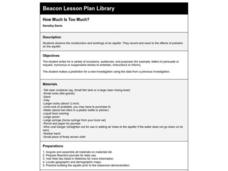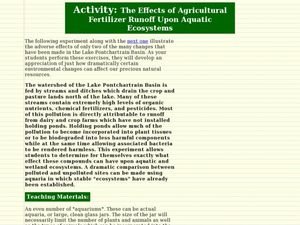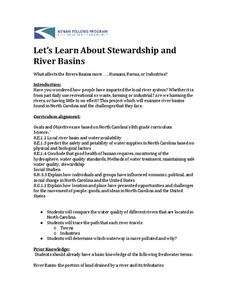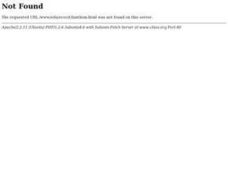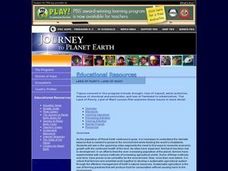Curated OER
Energy Resources
In this energy resources worksheet, learners read about the greenhouse effect and global warming. Then they explain why scientists are so concerned with greenhouse gases. Students also describe how global warming affects people worldwide.
Curated OER
HOW MUCH IS TOO MUCH?
Students observe the construction and workings of an aquifer. They record and react to the effects of pollution on the aquifer.
Curated OER
Marine Debris
Now is the time to educate tomorrow's citizens to care for the planet, and here is a lesson to help facilitate the process. Collect some marine debris and bring it into class. Have your class separate it into types and then test each...
Curated OER
Where Does Al the Waste Go?
Students construct a sanitary mini-landfill and an open mini-dump. Over a thirty day period, they compare the two methods and determine landfills are envorinmentally safer. They observe a demonstration of burning waste. They create...
Curated OER
The Effects of Agricultural Fertilizer Runoff Upon Aquatic Ecosystems
Students measure the toxic levels of runoff and discuss the effects it would have on the aquatic system. In this runoff lesson plan, students answer questions to how runoff would affect the animals in an aquatic system.
Curated OER
Global Change — Change and Cycles Where Land, Air and Water Meet
Pupils participate in an experiment to define a parts-per-billion solution. In this ecology lesson, students select a second substance to create a parts-per-billion solution and observe and record their results. Pupils work in groups to...
Kenan Fellows
Let's Learn About Stewardship and River Basins
What does it mean to be a good steward? Middle school environmentalists learn to care for their state's waterways through research, a guest speaker, and poster activity. Groups must locate and learn more about a river basin and the human...
Curated OER
To Protect Your Streams, Protect Your Mountains
Students build and experiment with a watershed to understand the effects of pollution. In this movement of water lesson, students work in groups creating rock formations and change the viscosity of the liquids falling down the mountain....
Curated OER
Land Use Unit
Students identify factors in human society and the natural environment aree interdependent. They analyze interdependencies demonstrated in various situations and occurances.
Curated OER
Estuary and Watershed
Young scholars investigate the San Francisco Bay Estuarine Research Reserve and watershed. In this estuary and watershed lesson plan, students complete 4 activities to better understand estuarine systems. They include studying the San...
Curated OER
How would an oil spill affect a Marine Sanctuary?
Students explore the concept of environmental stewardship. In this science lesson, students discover how scientists assess damages to the environment following oil spills. Students conduct a simulation of a public meeting in order to...
Forest Foundation
Fire - How Does it Relate to You?
Forest fires can be a necessary step in keeping a forest healthy, but what happens when they get out of control? Learners investigate the causes and effects of forest fires in two specific areas, culminating in a report about the ways...
Curated OER
No magic borders
Students discuss what they have heard about pollution. They explore the purposes and limitations of political boundaries and borders and identify some of the causes and effects of pollution.
Curated OER
Marine Debris
Students will perform experiments to examine if debris will float, or blow in the wind. They discuss the effects of these characteristics on marine debris.
Curated OER
The Atrazine Dilemma
Students understand how farming practices and the topography of a region can effect the health and safety of all living things. Students play a game which helps them understand how the chemical Azatrine has spread in the watershed.
Curated OER
Land of Plenty, Land of Want
Students view a video about the state of the environment. They discover the topic of sustainable agriculture. They identify problems and how to solve them.
Curated OER
Land Use and Nitrogen
Students consider the effects of development on water quality. They test nitrogen levels in waters before and after development, investigate wastewater treatment options and research best management practices to reduce nitrogen loads.
Curated OER
A Study of the Effects of Ethanol and Heavy Metal Chemicals on the Development of the Zebrafish Embryo
Students are exposed to the dangers of alcohol abuse through the study and experimentation of alcohol on zebrafish embryos. This exercise can be used to demonstrate the effects of ethanol, cadmium, and lead on embryological development.
Illinois Department of Natural Resources
Section Four: How Can We Protect Biodiversity?
Look into the future with a lesson plan on biodiversity and natural habitats. Learners read articles about different perspectives when it comes to planning future development, and decide which angle is the highest priority in a group...
NOAA
The Dead Zone
The fifth installment of a 23-part NOAA Enrichment in Marine sciences and Oceanography (NEMO) program defines dead zones and how they form. Pupils then examine data from the Gulf of Mexico to determine dead zone formation.
Curated OER
Geography of the Wasatch Front
Students examine and discuss urban geography and land-cover types along the Wasatch Front. They analyze thermal images, create collages, and predict surface and air temperatures from aerial photos in the Salt Lake City Valley.
Curated OER
Stream Ecology In Wisconsin and Puerto Rico
Students identify the different types of water and explain in what proportions they exist on Earth. They identify and correctly label the parts of the water cycle and how these parts interact with each other. Students identify the...
Curated OER
Nutrition: It's In Your Hands
Fourth graders use this lesson to focus on their health, nutrition and the state of the environment. In groups, they examine the various types of land, water and air pollutants and compare and contrast a food chain with and without a...
Curated OER
Water filtration with Plants
Sixth graders explain how soil and plants effect contaminated water in nature. In this filtration lesson, 6th graders work in groups to test biofiltration units. Students determine which biofiltration units work best and how they can...



